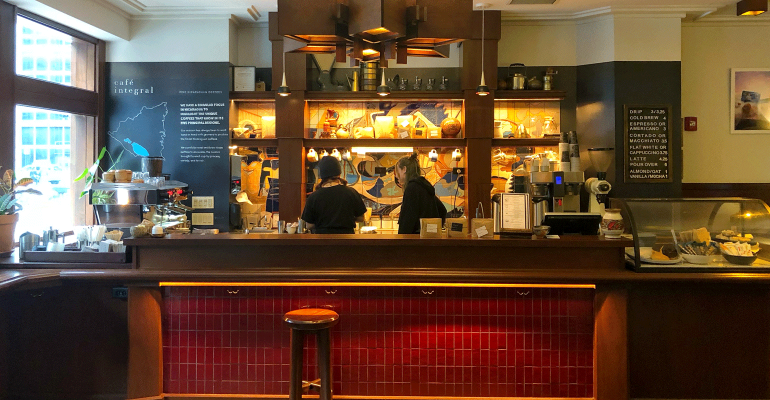For a growing number of chefs, the growth in pared-down hostels is providing an opportunity to create sophisticated foodservice.
Miami, New York, Chicago, Los Angeles and Dallas have all seen new hostel venues open in the past several years, along with everything from bar-like tapas restaurants to full-service dining spots.
The outlets range from the chef-created Jim & Nessie restaurant at the Generator Miami, the first outpost of the European-based hostel brand that made South Beach its 14th location, to the boutique and more prosaic Café Integral at the Freehand Chicago and Freehand Los Angeles hostel locations.
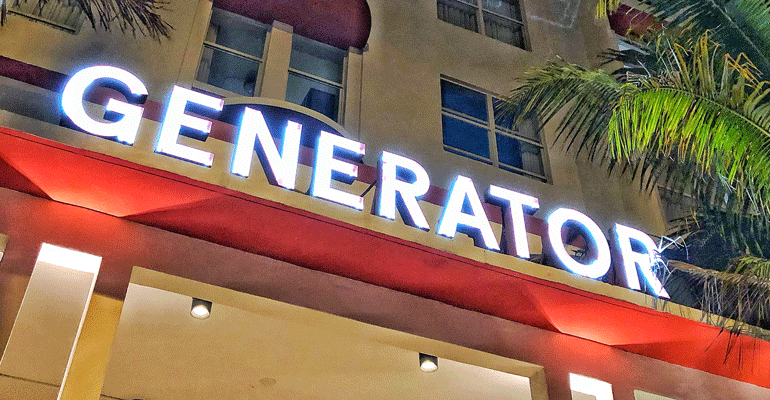
London-based Hostelworld, a hostel-focused online booking platform, released in mid-June results of its “Evolution of the Hostel Traveler” report, which surveyed more than 5,000 people from different generations across the United States, the United Kingdom, Australia, France, Germany, India and Brazil and found four in five (81%) of recent travelers — especially Gen Z and Millennials who went on extended trips of three weeks or visited multiple destinations — chose to stay in hostels above hotels.
That has drawn the attention of big players like McLean, Va.-based Hilton, which announced in October it would be rolling out a hostel-like brand called Motto by Hilton in early 2020.

“Following extensive market research that focused on consumers’ needs and wants, we discovered the opportunity for a brand that offers travelers a trifecta of centrally located, reasonably priced and less traditional lodging that provide a one-of-a-kind experience,” said Jon Witter, Hilton’s chief customer officer, in a statement. He said Motto by Hilton is “a flexible environment that allows guests to design their stay, their way.”
Other no-frills hostel groups are taking the same tack.
Miami-based Sydell Group has Freehand, which says it combines “the social culture of a hostel with innovative design, award-winning food and beverage.” The hostel chain has locations in Chicago, Los Angeles, Miami and New York.
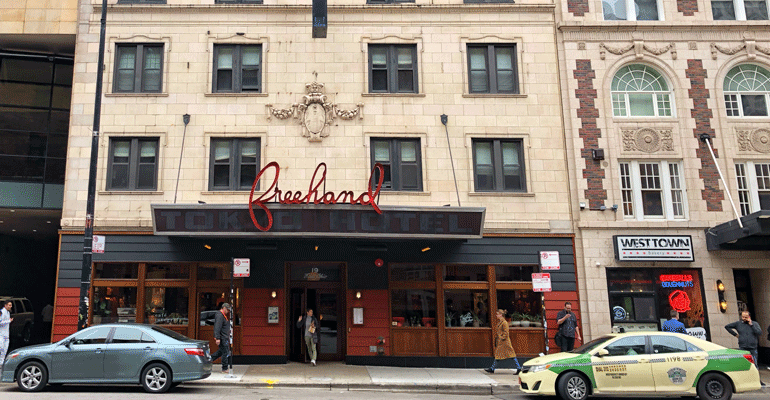
The Chicago and Los Angeles locations feature Café Integral with seasonal toasts, breakfast items and salads. The Freehand in Miami has 27 Restaurant; Los Angeles has The Exchange; and New York has multiple outlets, including a Smile to Go, a Simon & The Whale by Gabriel Stulman’s Happy Cooking Hospitality group and the all-day Studio restaurant.
Generator Hostels, which is in European cities like Amsterdam, Barcelona, Berlin, Copenhagen, Dublin, Hamburg, London, Madrid, Paris, Rome, Stockholm and Venice, opened its first U.S. hostel in October with 300 beds in 105 rooms. Dorm beds start at $25 night and king rooms are more than $100 a night.
The bedrooms are almost secondary to the food-and-beverage experience offered by The Jim & Nessie restaurant in part of the first-floor lobby in Miami. The menu, which offers small plates, was created by former Matador Room chef Daniel Roy and includes such items as cacio e pepe topped with shaved truffle, papas bravas with a shishito and romesco dip, and a 48-hour-brined chicken.
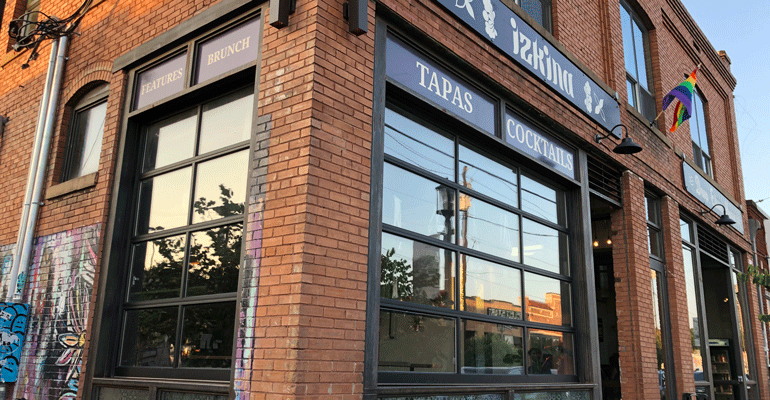
While most hostel properties remain small chains or independently branded, they remain a cost-effective way for travelers of any age to satisfy their wanderlust.
“A lot of these hostel guests are international business people,” said Joel Orsini, chef at the Izkina, a bar and small-plates restaurant that opened last July as part of the new Deep Ellum Hostel in Dallas.
And those international business travelers are saving their hotel budget to spend a little more on food and entertainment. They aren’t living out of a backpack and on a pack of ramen.
“You’d be surprised,” Orsini explained. “We have a lot of international and other business travelers in their late-20s to mid-40s. Our location is so close to downtown and the convention center. They get a way lower rate and they can use the budget for other things.”
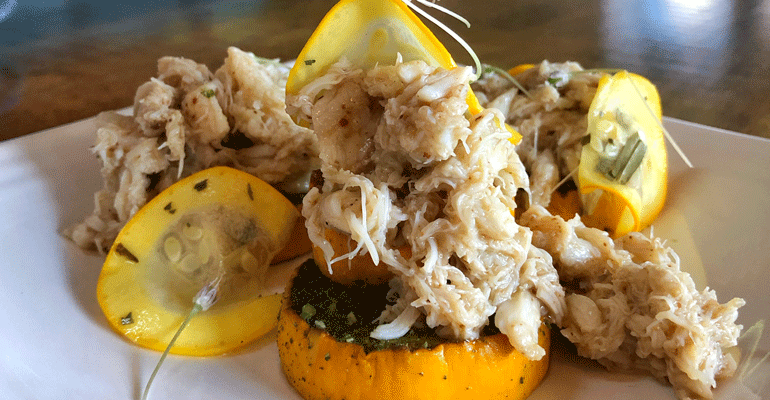
Orsini’s Izkina, which translates from Basque as “corner,” offers localized snacks created by the chef with roots at innovative local fine-dining establishments like FT33. Izkina occupies about 2,000-square feet in a corner of the Deep Ellum Hostel, which offers 70 beds in dorm-style accommodations and five private suites.
The atmosphere is casual, with counter-ordering and a wide selection of crafted cocktails and local beers.
“I wanted a new venue to showcase what I cared about most, which included purchasing all I possibly could out of the great state of Texas and using seafood out of the Gulf and buying from the all the farms in the area,” Orsini said.
“We are a bar first. It’s more of an experience you would get in Europe. It’s all counter service. They give you a number, and they bring your food to you. It’s more relaxed and gives the guest an experience on their own time,” Orsini said. “It gives them a lot more creativity in how they want their experience to go. We’re creating a unique experience. It’s more upscale than you would get at standard hostel.”
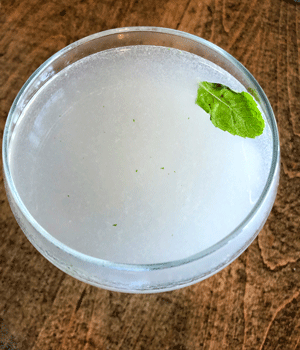 Orsini said he made it clear to the owners that he is a “no-waste” kind of person. “I don’t throw a single thing away. I make everything in-house,” he said. “And I love the small-plate aspect of things, because portion control is important to me.”
Orsini said he made it clear to the owners that he is a “no-waste” kind of person. “I don’t throw a single thing away. I make everything in-house,” he said. “And I love the small-plate aspect of things, because portion control is important to me.”
This year, Orsini developed his own rooftop garden for produce and installed a beehive.
“I hope this movement will help future generations learn about where their food comes from,” he said.
Orsini’s advice for any chef or beverage professional looking at partnering with a hostel is to look closely at the details.
“Make sure you map out every single detail before you sign anything,” Orsini said. “Know exactly what you are getting into and exactly what your growth and service goals are — six, eight months or a year down the road.”
Izkina, for example, opened a year ago with service six nights a week from 5 p.m. to 2 a.m., but food sales after 10 p.m. were light and they closed the kitchen after that hour. Izkina added a seventh night, a weekend brunch and service and a late-night window with sandwiches, chips and sodas. While hostel guests get a discount at Izkina as an amenity, Orsini said about 75% of business comes from non-hostel guests.
Contact Ron Ruggless at [email protected]
Follow him on Twitter: @RonRuggless

